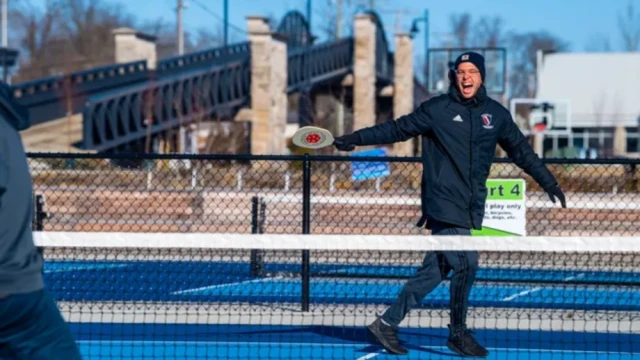
Chilly Challenges and Frosty Footwork - A Guide to Winter-Ready Pickleball Play
As winter sets in, the allure of pickleball remains strong, drawing players of all ages and skill levels to the chilly courts. Yet, with the exhilaration of the game comes the heightened risk of foot and ankle injuries in colder weather. Understanding the common injuries associated with winter pickleball and adopting preventive measures is crucial for players to stay active and injury-free during the colder months.
Common Winter Foot and Ankle Injuries
In the winter, pickleball players commonly face challenges like ankle sprains, fractures, and Achilles ruptures. The colder temperatures may contribute to increased incidents, making incorporating winter-specific warm-up practices and stretching into your pre-game routine imperative. For those with a history of ankle sprains, using an ankle-stabilizing orthosis/brace becomes even more vital to prevent re-injury in colder conditions.
Winter-Ready Footwear
Navigating the winter court requires specialized footwear. Investing in shoes tailored for cold-weather pickleball is paramount. Unlike running shoes ill-suited for colder conditions, court shoes designed for winter provide the necessary traction and stability. The low profile and flimsy fabric of running shoes are particularly compromising in cold weather, elevating the risk of injuries.
Cold-Weather Warm-Up Exercises and Stretches
Winter pickleball demands a unique warm-up routine. Engage in activities like a brisk walk, or a short run, or spend a few minutes on a treadmill or stationary bike to effectively warm and prime your muscles. Calf stretches, specifically tailored for cold-weather conditions, are crucial in preventing Achilles injuries in winter.
Addressing Persistent Winter Pain or Discomfort
In the winter chill, persistent pain or discomfort during or after playing requires immediate attention. Don't get yourself in a pickle, the HURT! app can guide you and provide information on where to start. Sudden pain, swelling, or audible pops or cracks may indicate serious winter-related injuries such as fractures or tendon tears. Chronic pain in colder conditions warrants prompt evaluation by a foot and ankle orthopedic surgeon or a physician’s assistant.
Winter Age and Skill Level Considerations
Winter pickleball introduces additional challenges. Age and skill level significantly influence the likelihood of cold-weather injuries. While younger players benefit from better bone density and tendon elasticity, beginners in winter conditions may experience a higher likelihood of injury as they adapt to the game in colder weather.
Winter Gameplay Strategies
The competitiveness of winter gameplay directly correlates with injury risk. A more relaxed, leisurely approach to the game can lower the risk of injuries in colder conditions. However, for those embracing the competitive spirit, wearing appropriate winter shoes and ensuring a comprehensive warm-up becomes paramount in minimizing the inherent risks associated with winter racket sports.
Winter Recovery Process and Facilitation
The recovery process in winter may be prolonged based on the nature of the injury. Fractures or Achilles ruptures in colder conditions may require months of rehabilitation before players can confidently return to the winter court. Adhering to a structured winter rehabilitation plan, following medical advice, and incorporating strength and flexibility exercises tailored for cold weather can facilitate a faster and more effective recovery.
As pickleball enthusiasts gear up for winter play, a proactive approach to foot and ankle health becomes the key to a thriving pickleball experience in colder temperatures. By adapting warm-up routines, choosing suitable winter footwear, and promptly addressing signs of discomfort, players can continue enjoying the sport throughout the winter months, ensuring a safe and injury-free pickleball experience.
Thank you to Dr. Sam Ford from the OrthoCarolina Foot and Ankle Institute for providing this blog information!
This information is provided as an educational service and is not intended to serve as medical advice. If you are seeking specific orthopedic advice or assistance, please consult with your OrthoCarolina physician or locate one in your area through OrthoCarolina’s website at www.OrthoCarolina.com.
Back




Leave a Comment